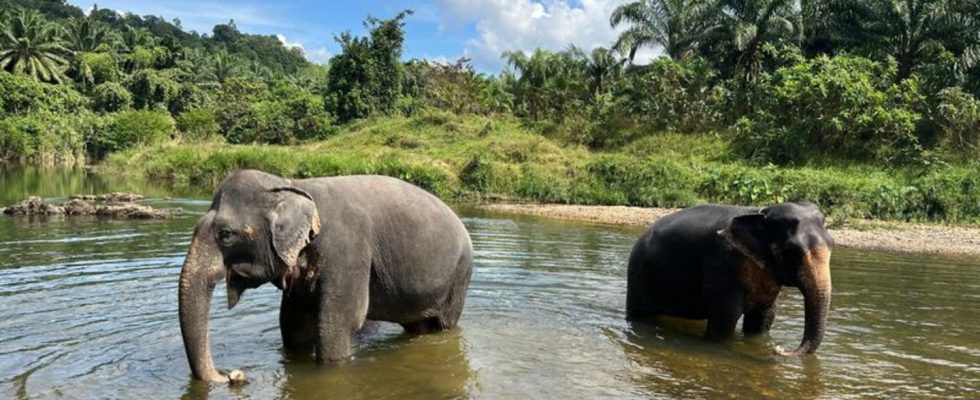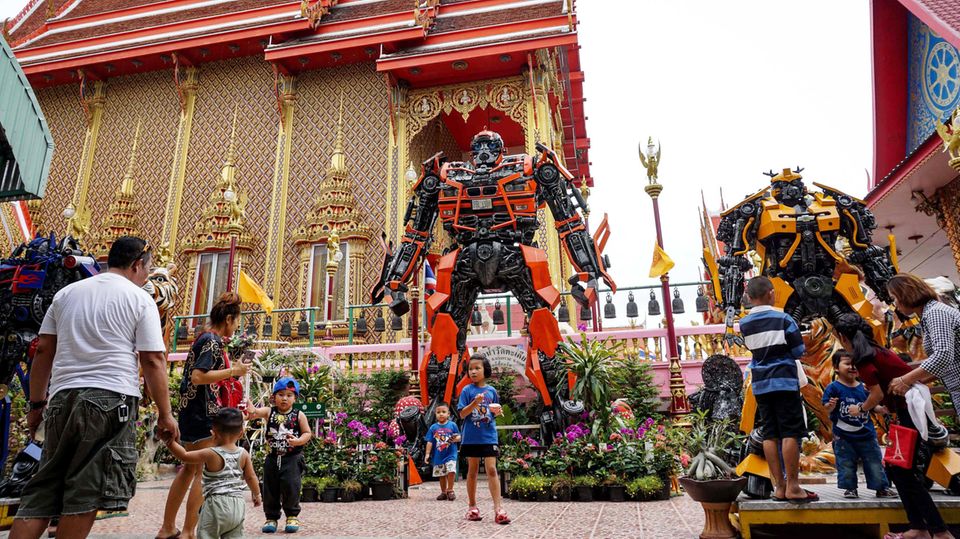Thailand
Man versus elephant: When animal protection becomes a problem
Two elephants in a river in Khao Sok National Park in southern Thailand
© Carola Frentzen/dpa
A conflict between elephants and humans has been simmering in Thailand for a long time. Now there are new victims on both sides, making the extent of the problem tragically clear.
The rangers who rushed to the scene are near the Tai Romyen National Park in the south Thailand is a shocking picture. Two wild elephants, a full-grown female and a strong bull, lie dead on the ground, struck down by electricity from an electric fence. There are burns on their trunks from the wires. The death of the protected animals made headlines in many Thai media outlets. Because this is just the latest chapter in the simmering conflict between humans and elephants in the Southeast Asian kingdom. There are victims on both sides.
For the owner of the durian plantation, who wanted to protect her fruits with the fence, the death of the animals last Thursday could mean a long prison sentence or a large fine. This is what the “Wildlife Conservation and Protection Act” of 2018 provides. Installing such fences is a “serious offense,” said local conservation officer Pornchai Sitthikaset.
Every time there are deaths – whether of the Thai people or of the animals – the extent of the problem becomes tragically clear. Effective solutions that would allow both parties to live peacefully are still being sought. Elephants’ natural habitat is shrinking, but their numbers have been increasing again in recent years because of government conservation measures. The result: Since there is often no longer enough food for the pachyderms in the forests, they invade farmland and tamper with the harvest.
Deadly attack in Thailand
Just at the beginning of October, a woman was fatally attacked by a wild elephant on a rubber farm in Chon Buri province in central Thailand. “Her death could be seen as a downside to the successful protection measures,” commented the Bangkok Post newspaper. Thanks, among other things, to anti-poaching patrols, forest elephants have increased significantly again.
This year alone, 16 people have fallen victim to aggressive elephants, and since 2012 there have been 105, the paper wrote, citing the Authority for National Parks, Wildlife and Plant Protection (DNP). Many more farmers were injured. On the elephant side, 92 animals died in the conflict during the same period. Electrically charged fences pose one of the biggest risks to them, along with power poles.
According to elephant protection organizations such as EleAid, up to 300,000 wild pachyderms probably roamed Thailand at the beginning of the 20th century. As the population exploded, their habitat was massively cleared. In addition, poachers keen on the bulls’ ivory decimated the population and captured calves to sell to tourist elephant shows. It is unclear how many animals live in the wild today – estimates range from 3,000 to 3,700 elephants.
Parade with eleven white elephants
Similar problems exist in many places in Asia and also in Africa. But hardly anywhere are elephants as deeply revered as in Thailand. They are the national animal and are considered lucky charms. There are elephant statues in many temples and shrines, companies advertise with elephant symbols, and one of the most popular beer brands is called “Chang” – the Thai word for elephant. Previous national flags from the time when Thailand was still called Siam featured elephants. And when the almost godlike King Bhumibol died in 2016, there was a parade with eleven white elephants in his honor.
During his lifetime, the monarch campaigned for the protection of animals and offered solutions. “Elephants should live in the forest and we must ensure there is enough food for them,” he said in a speech at the opening of Kui Buri National Park south of Bangkok. The park is considered a pioneer in tackling the problem. The farmers were offered alternative cultivation areas, the original landscape was restored with great effort – and the elephants were once again given an attractive home with plenty of food and water sources.
However, carrying out such complex projects on a large scale is virtually impossible, according to an editorial in the Bangkok Post. And volunteer squads that scare elephants away from plantations, as well as fences without electricity, have so far been unable to stop the animals from venturing into human settlements. “Wild elephants need more than our love,” the paper wrote. Above all, the animals need competent nature conservation and sustainable land management in order to live peacefully with people. Until then, farmers and elephants will continue to be on a collision course.


